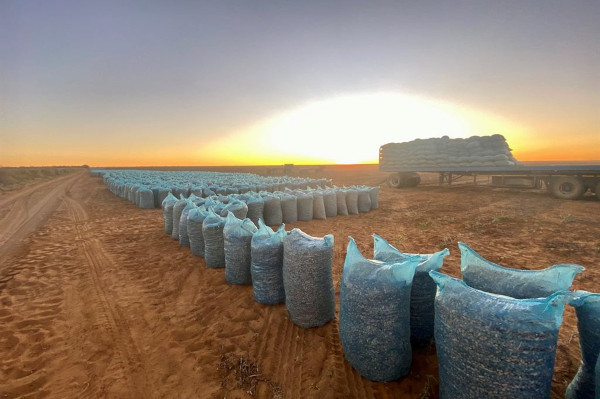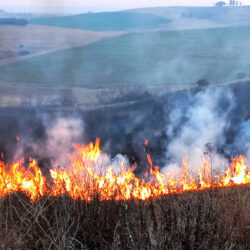Crime syndicates have such a strong hold on the countryside in North West that many farmers forego a 5% discount on early delivery of inputs rather than risk having them stolen from their sheds.
This is the second time in four months that he has been hit by input thieves. So says a farmer from the Coligny district about the theft of chemicals worth more than R1 million.
“In our case, 7% of the monetary value of our direct input was stolen. It’s alarming,” he says.
This is just a drop in the bucket of the millions of rands of losses that farmers suffer because the police are unable or unwilling to help them.
Private investigators who assist farmers with crime prevention and tracking down culprits believe the thefts are the work of a syndicate.
“I am working with 25 farmers who have been robbed by the syndicate over the past three years, and the total estimated losses exceed R200 million. These are only the cases we are aware of,” says an investigator who asked to remain anonymous.
According to investigators, the syndicate consists of South Africans and Mozambicans and targets grain farmers in North West and the Free State.
The Free State part of the syndicate is believed to operate from Bothaville, and the syndicate’s leader lives in North West. Stolen seeds are distributed nationwide and sold to farmers who “place orders” for them.
“The truth is that there are many farmers nationwide who purchase the stolen seeds and chemicals at lower prices, and as long as there is a market, the theft will expand,” says a farmer from the Stella area who also wanted his name withheld.
Vibrant market
“We are talking about seed packets. They will, for example, break in and steal only a specific cultivar or manufacturer’s seeds, along with enough herbicides and fertilisers for the seeds.
“We can no longer rely on discounts for early delivery because it is too much of a risk to store the products in warehouses for too long, and taking out insurance on them is just too expensive.”
Carl Bamberger, a Bayer sales representative in the districts of Delareyville, Vryburg and Tosca, and Kierie Barnard, chemical and nutrition advisor at Midchem NWK, say this type of crime has significantly increased in the past three or four years.
“Farmers still get a discount for early delivery, but they would rather pay 5% more on orders than have them delivered earlier,” says Bamberger. This takes a significant toll on farmers’ profits.
Bamberger and Barnard say the criminals clearly rely on farm workers for information because they know where to go, where the cameras are, and when farmers are absent.
“A product that is regularly stolen is Roundup. In a recent break-in in the Biesiesvlei area, the guys loosened the zinc plates of the warehouse right where the Roundup is stored and stole only that,” says Barnard.
The investigators say “thefts to order” are growing, but there are also many cases where warehouses are simply emptied and buyers then found.
Out of control
Six managers from private security organisations established by farmers across North West agree with the findings of recent research by crime expert and farmer Willie Clack among 201 farmers in the province, which revealed that 84% have no confidence in the police and 77% do not report crimes because they consider it pointless.
The security managers feel frustrated by the police’s lack of interest. This also applies to stock theft, which according to Clack’s research is the crime most experienced by farmers (see the table below).
Farmers’ exposure to crime in North West
Farmers’ exposure to crime in North West
Type of crime Exposure (%)
Agricultural products 17.9
Machinery (tractors or harvesters 8
Stock theft 45.3
Farm supplies and inputs (fuel, chemicals, fencing materials, livestock feed, animal medicines, and seeds) 28.9
Firearms 5.5
Equipment and tools 31.9
Money and personal items 10.4
SOURCE: WILLIE CLACK
When farmers were involved in seed theft investigations with the police, suspects were arrested and brought before the court, but since then no new arrests have been made.
“All details about suspects, minibus taxis used in the theft, files, and other incriminating information about the seed syndicate were handed over to the police in November last year,” says the private investigator.
“They were supposed to establish a provincial task team in both provinces and handle it further as an organised crime investigation.”
So far, an investigation team has been established in the Free State, but no new arrests have been made. In North West, no further steps have been taken.
Riaan van Zyl, manager of Sisu Farm Watch, which operates in districts such as Stella, Setlagole and Mareetsane, says fighting crime is an uphill battle.
“There are crime networks all over the province, and law enforcers from the ground level to the top are involved, benefiting from crime and making sure criminals are not arrested.”
Half-hearted investigations
Van Zyl’s counterparts in other regions agree that the crime is network-driven. “Although all forms of crime occur in North West, it is organised crime that is firmly established,” says Sarel Pretorius, head of crime at Agri North West.
“This includes stock theft and robbery, theft of input commodities and infrastructure, land occupations and intimidation, illegal hunting with firearms and dogs, and vehicle hijackings, including trucks transporting seeds.”
Pretorius, Van Zyl and Jopie van Staden from JP Security, which serves the Wolmaransstad, Klerksdorp and Potchefstroom areas, say only the obvious evidence is collected if the police happen to arrive at a crime scene, then there is a lack of intensive follow-up.
“It’s as if the police make it as unbearable as possible for farmers to open a case, and sometimes they only show up at the scene days after a crime has been committed,” says Van Staden.
With impunity
Pretorius says North West is well-known for large-scale corruption. “Criminals repeatedly get away because the criminal justice system fails us. There are so many examples where the version of the complainant and the criminal do not match, and then cases are simply dropped.”
Insufficient investigation at the crime scene and in follow-up work, weak witnesses and a lack of evidence cause many criminal cases to collapse. A legal practitioner who asked to remain anonymous says many accused simply do not show up in court, leading to cases being thrown out.
In many cases, summonses for court appearances are never issued or witnesses do not know they should be in court. In this practitioner’s office, there is a 50cm-high stack of summonses for accused individuals’ court appearances. They have been undelivered for two months because the responsible police officer’s vehicle allegedly does not have brake shoes.
According to the North West police 2021-2022 annual report, the province has 83 police stations, 44 of which are in rural areas. In 2021, it had 8,674 police officers and 2,701 vehicles.
The legal practitioner says police officers often complain to him that they do not have vehicles. According to security managers, police vehicles sometimes stand at the state workshop for months, waiting to be serviced or repaired. Two police officers confirmed this.
“Vehicles are allocated to police stations based on the number of cases they handle. Because there is definitely an under-reporting of cases, the existing figures do not reflect the truth, and this leads to a shortage of vehicles,” says Gert Viljoen, a former police officer, farmer and manager of the Eagle Eye/Uilhuis security group in the Schweizer-Reneke area, among others.
“The cause of cases ending up dead in the water is weak, corrupt cells within the SAPS in North West. It is very sad because there are also excellent police officers who do really good work and do everything in their power to fight crime.”
Relationships
Van Zyl and Pretorius urge farmers to build good relationships with effective police officers whom they can rely on.
“There is always at least one such person at each police station. Find that officer, go see him or her at the office, or call them at the office and work through him or her every time you file a case. That is currently the only way we can make progress in North West in combating crime,” says Van Zyl.
Farmers are disheartened
Clack recently singled out North West for a chapter in an international academic book on rural crime, Rural Perspectives on Crime and Justice.
In collaboration with Agri SA and TLU SA, he conducted a survey among 201 commercial farmers. Some of the findings include:
75.6% of the farmers had been affected by serious crime between 2017 and 2021, mainly cattle theft or theft of commodities and infrastructure.
Only 44.3% of farmers who were victims of crime reported it, with 23.9% reporting crime regularly, 24.4% from time to time and 6.5% never reporting it. (Research published by Clack in 2018 found that 77% of cattle theft cases were not reported.)
84% of those who did not report crime said they believed the police would not do anything about it.
45.3% of respondents were victims of cattle theft, 31.9% experienced equipment and tool theft, and 28.9% experienced theft of farming supplies and inputs, such as fuel, chemicals, livestock feed and veterinary medicines.
The book, edited by Alistair Harkess and Vania Ceccato, will be published at the end of the year.
This is how North West criminals operate
Security managers who assist farmers say they rely heavily on informants. One of these informants, who spoke to Landbouweekblad on condition of anonymity, says one of the starting points of the crime culture in North West is the lack of proper control over foreigners entering South Africa from neighbouring countries.
“This has particularly increased since 1996. The illegal immigrants mainly rely on crime for survival and become part of a group that expands wider. Eventually, networks are formed that include foreigners and South Africans.”
Furthermore, residents of informal settlements often leave good jobs because they see their family or friends making much more money from crime. They also become part of the networks.
“All criminals absolutely depend on good relationships with corrupt police officers at grassroots and management levels. Such relationships are usually established by regularly providing stolen meat or livestock to the police officers,” says the informant.
“I know of a station commander who now owns an entire herd of cattle and makes a lot of money, all from stolen livestock. And that’s just one of many examples.”
The informant says it’s becoming easier to get away with crime, and parents even teach their children that it’s right to make money this way instead of begging or seeking work.
“In the circuit court that occasionally comes to us, the reason to find people innocent is usually that there is not enough evidence against them,” he says. He claims to have reported corrupt police officers many times, but says they are never investigated.




